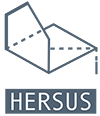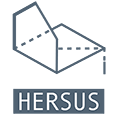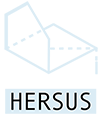The centre of Thessaloniki, the second largest city of Greece, is home to the 3rd International Hersus Workshop, themed: Resilience and Future Heritage. The Mediterranean coastal city is located at the north of Greece, built amphitheatrically, around the gulf of Thermaikos and has a rich history that attracts the interest of historians, archaeologists and ethnologists.
Phase 1: 6th – 7th October (online)
Students will attend the online introductory presentation of the topic, location and task and the six lectures on adaptive reuse.
Phase 2: 17th – 21th October (on site)
Intensive workshop comprised of site visit of Central Market Area Thessaloniki and group work with tutors on site.
Phase 3: 27th October (online) + 3rd and 10th of November 2022 (virtual exhibition)
Individual work with two sessions for discussion with critics and final projects presentation.
Case Study
The central market area constitutes an exemplary continuation of use in the diachrony of the city. Hebrard’s plan, envisioned the future built heritage that the workshop will deal with. Shaped by the pressures of private and public economic agendas, the original plan has evolved, after gradual transformations of the area, in the shape of two superblocks – off the main Aristotelous Axis, delineated on their periphery by large building blocks while maintaining an internal reference to a human scale, whereby the perceived foreground is dominated by listed single or two-storey volumes and narrow pedestrianized passageways. The reality of occupancy in the greater area, shaped by economic, political and societal stress during the last 20 years, is gradually evolving into a mixed use paradigm whereby restaurants and tavernas coexist with creative spaces, butchers, grocers, retail and craftsmen. Most building stock is in need of restoration but has nonetheless been in constant use. The area has a rich and colourful soundscape dominated by anthropogenic sounds and a smellscape that is varied between fresh produce, raw and cured meat, food odours, the smell of garbage or the smell of others, constituting a harsh contrast to the usual urban soundscape of traffic noise and the smellscape of artificial odours and exhaust fumes.
The workshop views the area as a useful resource in achieving social, economic, cultural and environmental sustainability and resilience for the city of Thessaloniki (part of the Resilient Cities Network). The case study employs sustainability and resilience indicators to build upon /evaluate the most recent major urban design interventions in the area, which took place in the context of Thessaloniki’s role as the Cultural Capital of Europe (1997), but also on bottomup approaches that have emerged recently, which aim to regenerate the area through cultural events and actions (Kapani project).
Issues of occupancy and land use, the environmental performance of the urban fabric surrounding the markets, the future restoration and upgrade of the market building stock and the redesign of public open areas within the two superblocks will challenge attendees and focus the international team’s proposals.


